You only need 3 ingredients to make a deliciously sweet Okinawan treat called Sata Andagi. It’s a type of deep-fried donut or dango from Okinawa, Japan that is the winning combination of crispy and cakey!
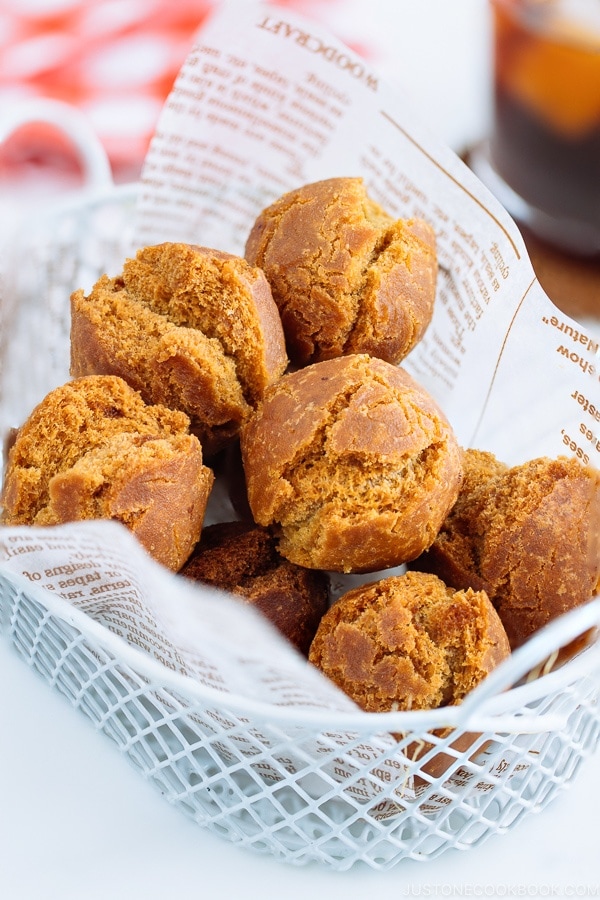
During our short stay in Okinawa, we had a few chances to enjoy different flavors of Okinawan doughnuts, Sata Andagi (サーターアンダギー). Not only these doughnuts were on a list of must-eats when we visit, they are also known as an easy homemade snack in Okinawa. Since the idea of easy is always appealing, it had been on my mind to try my hand at these yummy doughnuts for a while.
Of all the various fun flavors, I decided to make Black Sugar Sata Andagi first. Relatively unrefined, black sugar is a common sugar in Okinawa and its deep malty, caramel-y characteristic enhances the flavor of the doughnuts tremendously.
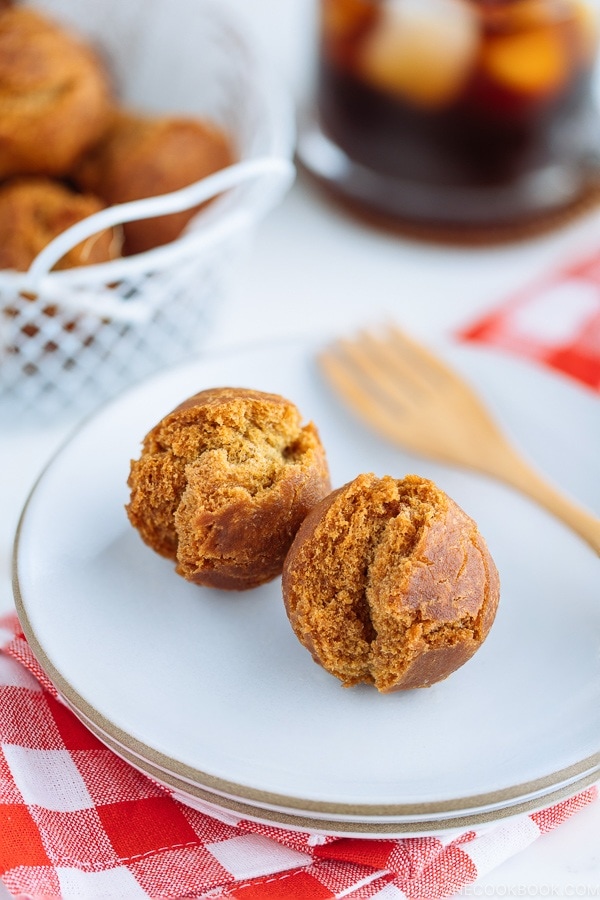
What is Sata Andagi?
Sata Andagi (サーターアンダギー or サーターアンダーギー) is a doughnut made with 3 ingredients – cake flour, sugar, and egg. The name comes from Okinawan word: sata means sugar and andagi means deep fried (food). The texture of sata andagi is very dense, and less airy and fluffy like the regular doughnuts.
When deep fried, the round balls crack with lines that resemble smiley faces, which is why the doughnuts are considered good luck in Okinawa and are used for many happy occasions such as engagements and birthdays.
In Okinawa, where the weather is hot and humid, sata andagi keep well at room temperature for a few days. No wonder they have been enjoyed as homemade snacks for generations. If you visit Okinawa, the easiest place to spot sata andagi is at touristy places where you’ll see tiny kiosks selling these sweet treats. You can also find sata andagi specialty stores throughout Okinawa.
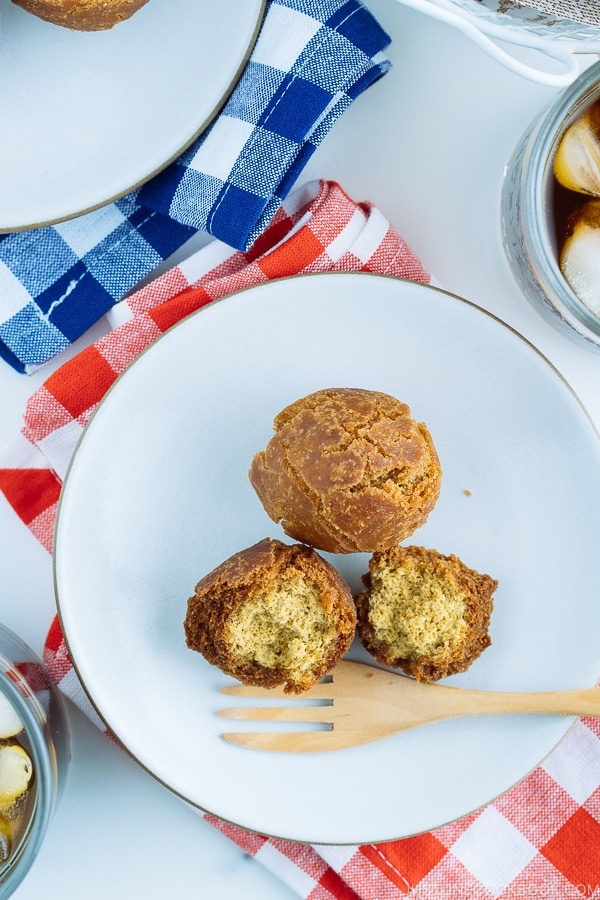
Popular Sata Andagi Flavors
Many sata andagi shops carry similar flavors (shown in bold) but there are other delicious flavors that I didn’t get to try.
- Plain
- Beni imo (Okinawan sweet potato)
- Black sugar (Kokuto)
- Black/white sesame
- Black tea
- Caramel
- Cheese
- Chocolate
- Cinnamon
- Coconut
- Coffee
- Kabocha (Japanese pumpkin, Kabocha squash)
- Kinako (soybean flour)
- Mocha
- Peanut
- Walnut
Sata Andagi has no fillings or fancy frosting. The ingredients are mixed in with the dough to make different flavors. Does any of the flavors above catch your attention?
If you haven’t made doughnuts before, you’d be happy to know that these Okinawan doughnuts are rather straightforward. The only caveat is the deep frying, but since they were delicious in the way that deep fried dough is, it’s worth the effort. My family loves that they are not overly sweet, but more of a snacking doughnut, not a heavily glazed dessert doughnut that can bog you down easily. And yes, you can definitely eat them on a more regular basis. Okinawans say so! 🙂
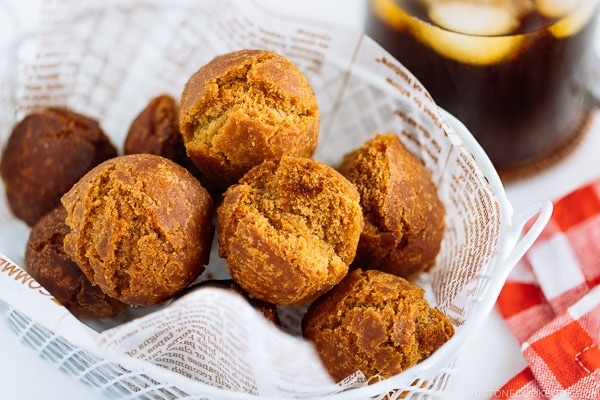
Wish to learn more about Japanese cooking? Sign up for our free newsletter to receive cooking tips & recipe updates! And stay in touch with me on Facebook, Pinterest, YouTube, and Instagram.
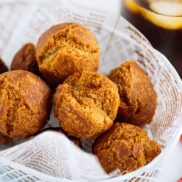
Sata Andagi
Video
Ingredients
- 1 large egg (50 g each w/o shell)
- ⅓ cup black sugar (packed; I used dark muscovado sugar that I bought on Amazon, but you can also purchase Okinawan black sugar on Amazon)
- 1 tsp neutral oil
- 1 cup cake flour (plus more if needed; weigh your flour or use the “fluff and sprinkle“ method and level it off; you can make your own cake flour at home)
- 1 tsp baking powder
- ⅛ tsp Diamond Crystal kosher salt
- 3 cups neutral oil (plus more for rolling the dough)
Instructions
- Gather all the ingredients. I highly encourage you to weigh your ingredients using a kitchen scale for this recipe. Click on the “Metric“ button at the top of the recipe to convert the ingredient measurements to metric. If you‘re using a cup measurement, please follow the “fluff and sprinkle“ method: Fluff your flour with a spoon, sprinkle the flour into your measuring cup, and level it off. Otherwise, you may scoop more flour than you need.
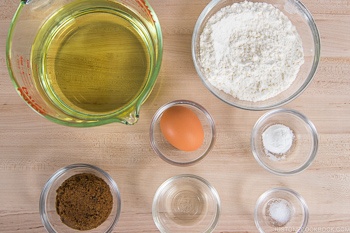
To Make the Dough
- In a large bowl, combine 1 large egg (50 g each w/o shell) and ⅓ cup black sugar. Whisk together until the sugar has dissolved.

- Add 1 tsp neutral oil and whisk together.

- Sift 1 cup cake flour, 1 tsp baking powder, and ⅛ tsp Diamond Crystal kosher salt over the egg and sugar mixture.

- Using a silicone spatula, start to combine the dry and wet ingredients. If the dough is too wet, you can add extra flour. Humidity and moisture in the air affects your dough. If you feel that your dough is too soft and wet, add more flour, 1 Tbsp at a time. The consistency is similar to cookie dough, but slightly softer. Let the dough rest for an hour.

To Roll the Dough and Deep-Fry
- Bring 3 cups neutral oil in the deep fryer or medium saucepan to 300–320ºF (150–160ºC) over medium-low heat. In order to cook the inside of the doughnut, we deep-fry at low temperature. (You can use less oil, but you will need to rotate the balls often as they won’t be covered by oil.)
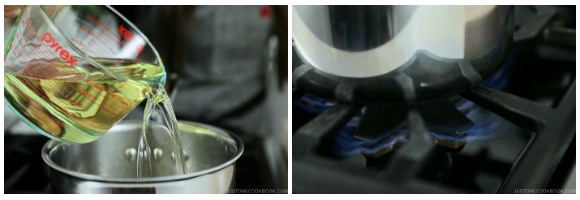
- Prepare some extra oil (for rolling the dough) in a small bowl and rub it on your palms to prevent the dough from sticking to your hands.
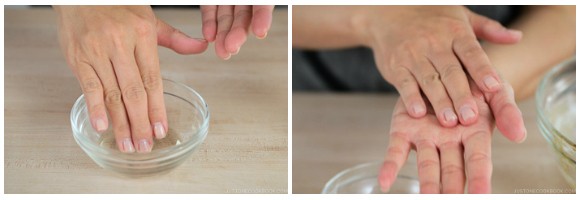
- When the oil in the deep fryer reaches 300–320ºF (150–160ºC), scoop the dough with a cookie scooper into your hand and roll it into a ball. It should be around 3 cm (slightly bigger than 1 inch) or about the size of a Ping-Pong ball. Tip: To achieve the same portion size, a cookie scooper is a great tool to have.
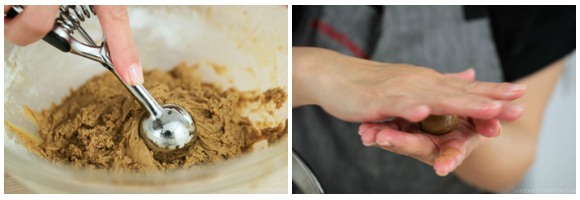
- As soon as you are done rolling the dough, start adding the dough balls to the oil. They will expand as they cook, so do not add too many and crowd the pot.
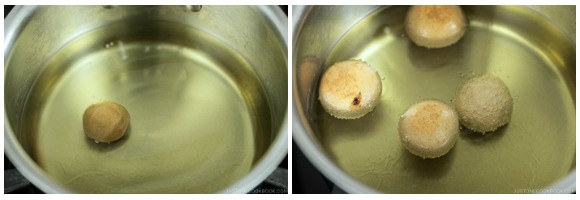
- Once the dough balls are cooked through, they will start to float. They rotate themselves, but you can help them rotate to achieve even coloring.
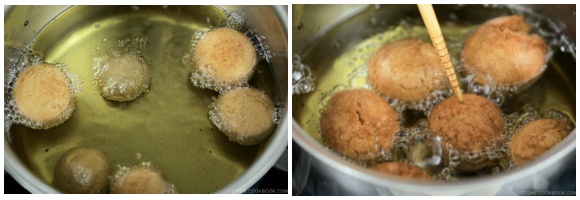
- When golden brown, after about 7–8 minutes of deep-frying, pick them up and drain excess oil on a paper towel or wire rack. Let cool for 5 minutes and enjoy!
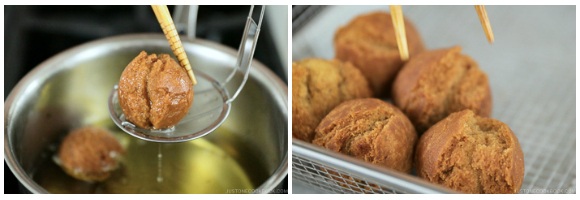
To Store
- You can store the leftovers in the refrigerator for 3 days and in the freezer for 2 weeks.
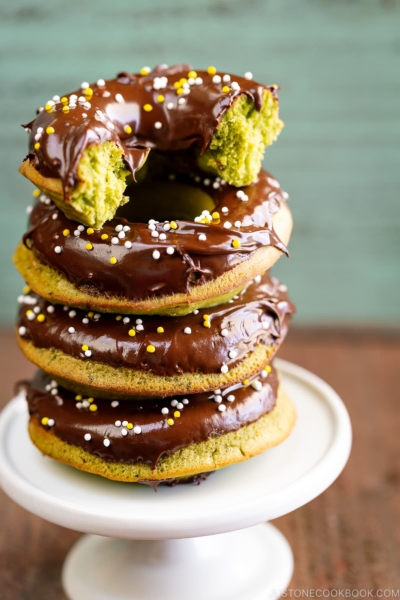
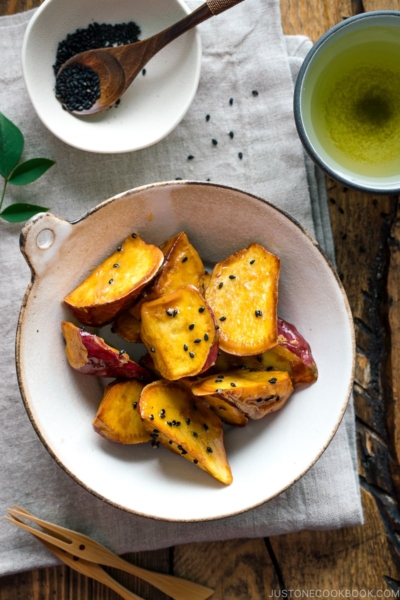
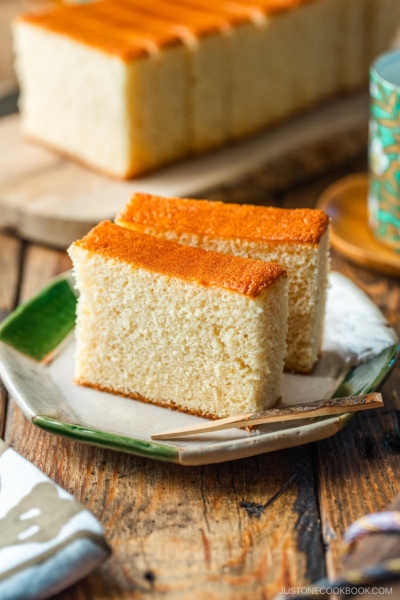
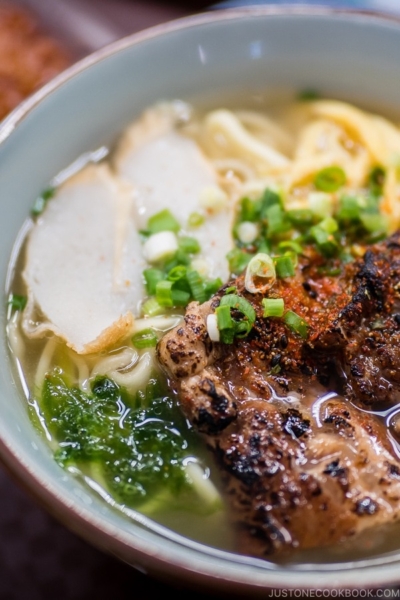
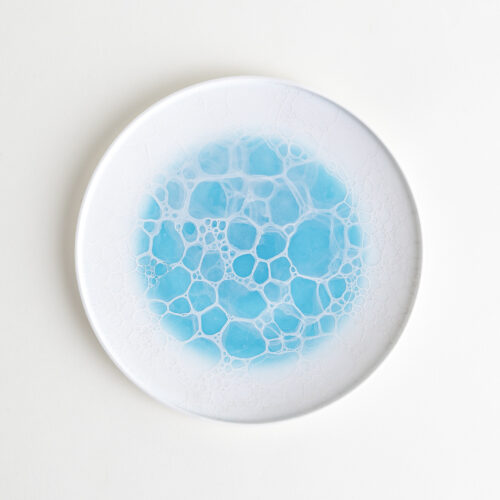
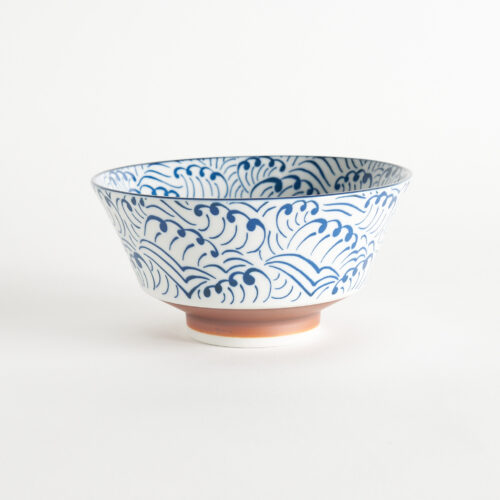
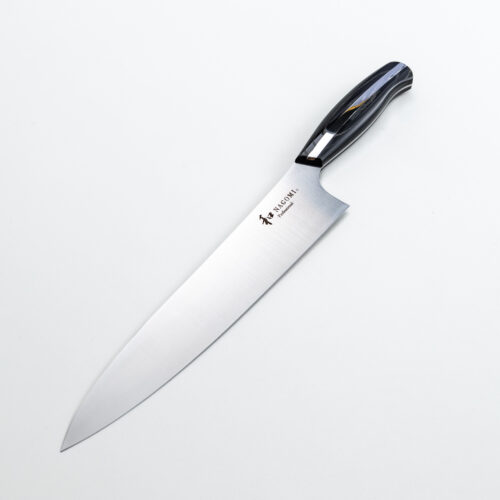
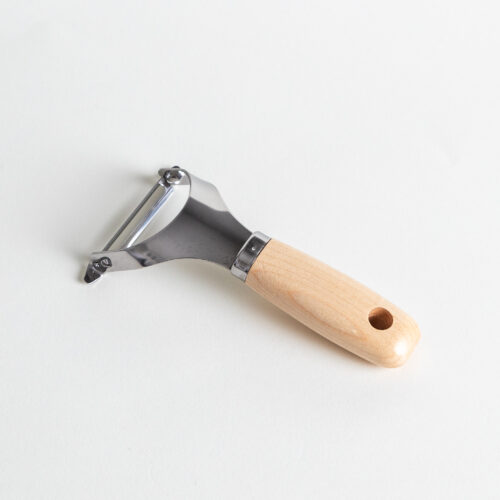
Thx for sharing your recipe. Unfortunately came out dry and lacked flavor. I have tried your curry and it’s delish.
Hello there! We’re sorry it didn’t come out as you hoped.
Thank you for trying Nami’s recipe and providing feedback.🙂
I made this recipe using Bob’s Red Mill 1-to-1 gf baking flour and it worked great! I’ll definitely make these again.
Hi Julie! Thank you so much for trying Nami’s recipe and sharing the result with us.
We are so happy to hear that it worked! Thank you!🫶🏻
Wow, I just made these and I’m speechless! They’re super delicious! Not too sweet which is perfect because I like it less sweet anyway. I guess I’ll be making them again really soon! (I bought Muscovado sugar to make them and when it arrived I totally forgot for which recipe I was buying it! So glad I remembered and finally tried these!!) Thank you for this amazimg recipe!
Hi Laura! Thank you very much for trying Nami’s recipe and for your kind feedback!
We are so happy to hear you enjoyed homemade Sata Andagi! Happy Cooking!
Hi, may I know if I could use the Okinawa Black sugar syrup instead of the Okinawa black sugar granules? And, if it is ok, do I use the same quantity?? Thanks in advance!!
Hi Sue, Yes, you can use syrup for this recipe. However, some of the syrup is sweeter than sugar, so it’s hard to tell how much will be equal to this recipe without testing it. If you do not like it very sweet, instead of 1/3 cup, you can try 4 Tbs (1/4 cup)?
Can I use an air fryer??
Hi Asher!
We have never used an air fryer for this recipe before, so we are not sure how the outcome will be… please let us know how it goes! 🙂